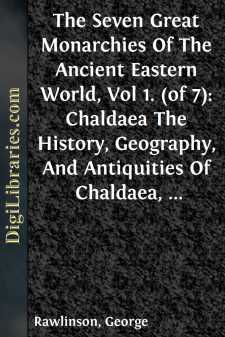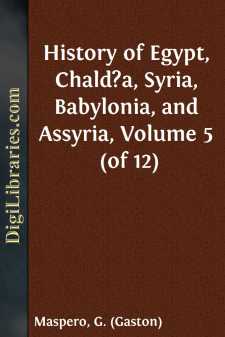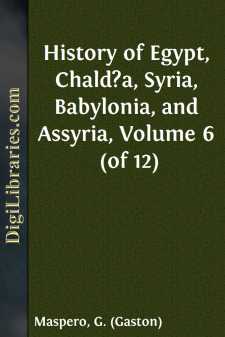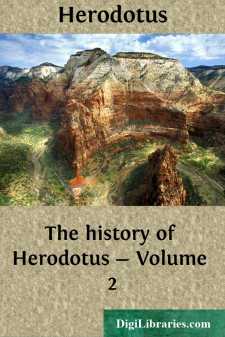History
- Africa 30
- Americas (North Central South West Indies) 50
- Ancient 68
- Asia 58
- Australia & New Zealand 8
- Canada 41
- Caribbean & West Indies 1
- Civilization 20
- Eastern Europe 12
- Europe 310
- Expeditions & Discoveries 60
- General 77
- Historical Geography 1
- Jewish 9
- Latin America 3
- Medieval 8
- Middle East 13
- Military 248
- Revolutionary 8
- Study & Teaching 5
- United States 353
- Western Europe 56
- World 13
History Books
Sort by:
I.--The Nile and Egypt A long, low, level shore, scarcely rising above the sea, a chain of vaguely defined and ever-shifting lakes and marshes, then the triangular plain beyond, whose apex is thrust thirty leagues into the land--this, the Delta of Egypt, has gradually been acquired from the sea, and is, as it were, the gift of the Nile. Where the Delta ends, Egypt proper begins. It is only a strip of...
more...
by:
George Rawlinson
CHAPTER I. GENERAL VIEW OF THE COUNTRY. "Behold the land of the Chaldaeans."—ISAIAH xxiii. 13. The broad belt of desert which traverses the eastern hemisphere, in a general direction from west to east (or, speaking more exactly, of W. S. W. to N. E. E.), reaching from the Atlantic on the one hand nearly to the Yellow Sea on the other, is interrupted about its centre by a strip of rich...
more...
CHAPTER I—THE ASSYRIAN REVIVAL AND THE STRUGGLE FOR SYRIA Assur-nazir-pal (885-860) and Shalmaneser III. (860-825)—The kingdom of Urartu and its conquering princes: Menuas and Argistis. Assyria was the first to reappear on the scene of action. Less hampered by an ancient past than Egypt and Chaldæa, she was the sooner able to recover her strength after any disastrous crisis, and to assume again...
more...
by:
Herodotus
PREFACE If a new translation of Herodotus does not justify itself, it will hardly be justified in a preface; therefore the question whether it was needed may be left here without discussion. The aim of the translator has been above all things faithfulness—faithfulness to the manner of expression and to the structure of sentences, as well as to the meaning of the Author. At the same time it is...
more...
CHAPTER I—THE IRANIAN CONQUEST The Iranian religions—Cyrus in Lydia and at Babylon: Cambyses in Egypt —Darius and the organisation of the empire. The Median empire is the least known of all those which held sway for a time over the destinies of a portion of Western Asia. The reason of this is not to be ascribed to the shortness of its duration: the Chaldæan empire of Nebuchadrezzar lasted for a...
more...
CHAPTER I—THE EIGHTEENTH THEBAN DYNASTY—(continued) Thutmosis III.: the organisation of the Syrian provinces—Amenothes III.: the royal worshippers of Atonû. In the year XXXIV. the Egyptians reappeared in Zahi. The people of Anaugasa having revolted, two of their towns were taken, a third surrendered, while the chiefs of the Lotanû hastened to meet their lord with their usual tribute. Advantage...
more...
CHAPTER I—THE DISCOVERY OF PREHISTORIC EGYPT During the last ten years our conception of the beginnings of Egyptian antiquity has profoundly altered. When Prof. Maspero published the first volume of his great Histoire Ancienne des Peuples des l'Orient Classique, in 1895, Egyptian history, properly so called, still began with the Pyramid-builders, Sne-feru, Khufu, and Khafra (Cheops and...
more...
CHAPTER I—THE CLOSE OF THE THEBAN EMPIRE—(continued) Ramses III.: Manners and Customs—Population—The predominance of Amon and his high priests. Opposite the Thebes of the living, Khafîtnîbûs, the Thebes of the dead, had gone on increasing in a remarkably rapid manner. It continued to extend in the south-western direction from the heroic period of the XVIIIth dynasty onwards, and all the...
more...
CHAPTER I—SENNACHERIB (705-681 B.C.) The struggle of Sennacherib with Judæa and Egypt—Destruction of Babylon. Sennacherib either failed to inherit his father's good fortune, or lacked his ability.* He was not deficient in military genius, nor in the energy necessary to withstand the various enemies who rose against him at widely removed points of his frontier, but he had neither the...
more...
by:
Herodotus
BOOK V. THE FIFTH BOOK OF THE HISTORIES, CALLED TERPSICHORE 1. In the meantime those of the Persians who had been left behind in Europe by Dareios, of whom Megabazos was the commander, had subdued the people of Perinthos first of the Hellespontians, since they refused to be subject to Dareios. These had in former times also been hardly dealt with by the Paionians: for the Paionians from the Strymon had...
more...











